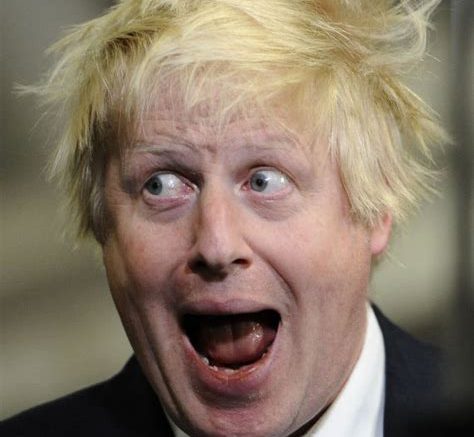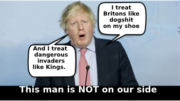I find the timing of the recent announcement by Boris Johnson’s government’s announcement of a ‘war on drugs’ extremely interesting. It comes at a time when the Conservatives are taking a hit in by-elections and in the various political polls. It has also been announced when the spectre of sleaze is starting to haunt the government, there is increasing anger among the population about unrestricted immigration and as people start to realise how much the green extremist net zero ideas promoted by Johnson and his wife Carrie will cost the average British subject.
The more I look at the context of Boris Johnson’s government announcement about the ‘war on drugs’ the more I start to consider whether this announcement and its timing is little more than a shiny bauble to distract people from the Government’s current problems. It certainly appears to be specifically crafted to appeal to older Tory voters and also appears to be quite knee jerk and not properly thought out.
The first thing that makes me think that this new announcement is a distraction is the amount of money involved. The Government says that they will spend £300 million over a period of ten years on this scheme. However when you put that amount into context it isn’t really a lot for a ten year project. After all the NHS pisses that amount up the wall every damned day.
Here’s what Sky News said about the new project. As usual the original text is in italics whereas my comments are in plain text.
As part of a 10-year plan for tackling drugs crime in England and Wales and taking on the “kingpins” behind supplies, the prime minister warned criminals they will have “nowhere to hide”.
Drugs is a demand led business. Take out one kingpin and others will step up to take their place.
The government in their statement promised that they would ‘take out’ the county lines gangs moving drugs around the country but again this is a supply side measure that does not tackle the demand side. There are already actions being taken against county lines groups but as soon as one group is busted another will take its place. Demand must be tackled.
Among other action being pledged in the drugs strategy, the government is promising to:
• Carry out 6,400 disruptions against the activities of organised criminals – an increase of 20%
Various police forces are already working flat out in this area so I’m dubious about whether this ‘20% increase’ can be achieved or how it can be measured.
• Expand the use of drug testing when police make arrests in order to direct users towards treatment or other interventions
Already being done and there’s no indication as to how much this will be expanded.
• Increase the number of police forces who will run new schemes focused on intervening on a wide range of individuals at an early stage, such as attendance at drug awareness courses with criminal sanctions possible for those who continue to use drugs
I suspect that any extra money allocated to this will be eaten up in administration costs with very little ground level results.
• Test messages on university campuses as part of a pilot campaign to try and discourage drug use at an early stage
Have those behind this policy ever met any students? Drug use is already embedded in this cohort and although such messages might dissuade some from getting in to Heroin or crack cocaine, I doubt it will have the wide ranging effects that those behind this policy say will happen.
• Give judges power to order drug testing of anyone serving a community sentence whose offending is related to drug use, with them liable to be re-sentenced to a prison term if they test positive.
Are not the prisons already overcrowded? It would be far better to sentence such people, who often have concurrent mental health problems to a term in a psychiatric hospital. Oh wait! Most of Britain’s mental health hospitals have been closed down.
• Use drug dealers’ seized phones to contact their clients with messages to discourage drug use or direct them to support.
All this will achieve is a flurry of customers choosing to change their phones or phone numbers.
The government is also promising further plans to look at new measures to reduce demand and deter people from illegal drug use through more meaningful consequences.
This is a bit ‘woolly’ to say the least.
The Sun reported that harsher punishments to deter drug use could include the removal of passports and driving licences, night-time curfews and travel bans such as those imposed on football hooligans.
Those who make enormous amounts of money from selling drugs are unlikely to be deterred by these sanctions. If a criminal is making £1 million from a shipment they are unlikely to be bothered by losing their driving licence and passport confiscation is not going to affect those with dual nationality or foreign nationality. What I suspect will happen is that these sanctions will affect the low hanging fruit of the drug world, individual low level users or the employees of cartels, not the kingpins as the government claims it will.
There’s no mention of what I would really like to see and that is treatment for those with drug problems. As Yvette Cooper pointed out in the Sky article there is now less money for drug treatment than there once was. Ms Cooper claimed that there is £100 million less available for treatment than there was in 2010. Whether her figure is accurate is difficult to say but drug rehab comes under the purview of the Mental Health system and in Britain that Mental Health system is both creaking and completely unfit for purpose.
Over the five decades I’ve been on this earth I’ve seen too many good people succumb to hard drugs and mess their lives up because of it. People who were bright, intelligent and who had a lot going for them before they chose Heroin or Cocaine over a decent life where they could have achieved their potential. One in particular stands out. A young woman who could speak multiple languages and had a bitingly sharp intelligence fell in with a bad crowd, including the drug addicted son of a national newspaper reporter. The last I heard of her, which was thirty odd years ago was that she was desperately trying to get access to rehab in the UK but was failing to get that access. I would not be at all surprised to find that this lady who could have done great things is now dead. These policies do nothing to help people like that. There’s little in the way of help to get people out of hard drugs and it is almost completely driven by a supply side policy that I suspect will fail. This will not tackle demand because too much of the demand is coming from those who are in some form of psychological distress or who live in areas and come from communities that have been wholly forgotten by Government. Those with no future because there are no jobs and no way of working or educating their way out of their current situation will too often turn to drugs as a temporary way out of their distress and equally all too often find themselves getting trapped in an even worse situation caused by the drugs. Drugs are a horrible thing to become involved in and I fail to see how these policies will stop people becoming involved. If we tackle the hopelessness then we also tackle the root of the drug problem but I see no sign that the Tories being willing to do this. ‘Levelling up’ cannot be achieved solely by prescriptive policies like these when quality education, jobs and hope are what is required.
The piss poor amount of money allocated to this scheme, when compared to the money flung at the NHS for example, does make me think that this policy is sound and fury signifying nothing. This is a policy that sounds good and has probably been put together with an eye on keeping older Tory voters on board or bringing these voters back to the Tories, but whether it will achieve anything concrete or whether it will create additional problems is not certain. Demand side policies and better access to rehab treatment might have made a difference but I doubt that these policies will.
I’d like to conclude by drawing attention to the language used in this policy announcement. The use of the term ‘war on drugs’ is associated with failure. We’ve had a war on drugs in the West ever since former US President Richard Nixon announced it in 1971 and this war rages on without any sign that it will end or will ever succeed. This ‘war on drugs’ language being used by HMG does make me wonder if history will repeat itself. We could one day, possibly sooner than we think, find ourself subjected to Boris Johnson following some government scandal making a similar TV appearance to that made by Richard Nixon during Watergate and telling the nation ‘that there will be no whitewash at Number Ten’.






There is little doubt that this is just a vain attempt to regain some shred of confidence when the voters are deserting the Conservative party in droves. Considering the reported drug use in Westminster its little wonder the government is anouncing that the crack down will be on middle class drug use. Presumably the drug abusers in Westminster are upper class and as we are well aware the ruling class is above the law anyway, cocaine anyone?
Most of the Commons seem to be middle class lawyers and ex public sector types, not the scions of the aristocracy. However I agree with yu tht this is an attempt to motivate Tory voters who are increasingly pissed off with the current non-conservative conservative party.